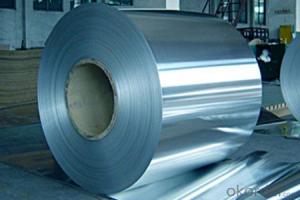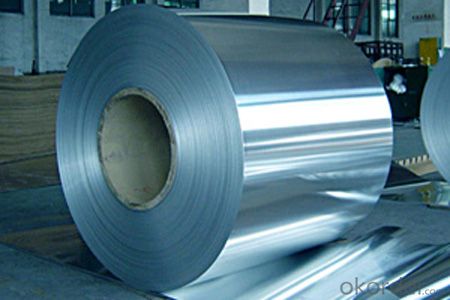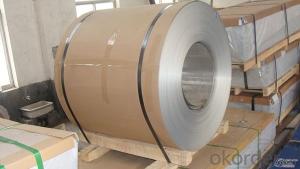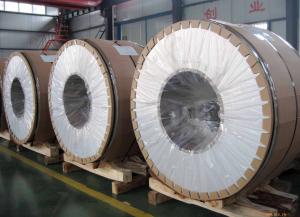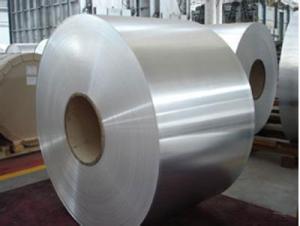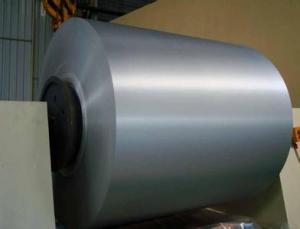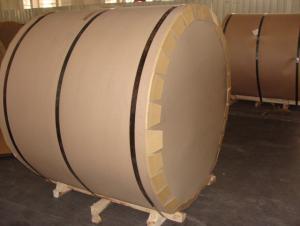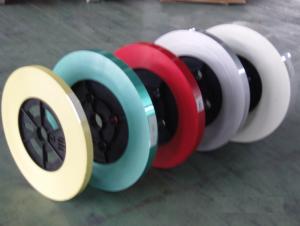PVC Aluminum Coil 3xxx Mill Finished
- Loading Port:
- China Main Port
- Payment Terms:
- TT or LC
- Min Order Qty:
- 5 m.t.
- Supply Capability:
- 100000 m.t./month
OKorder Service Pledge
OKorder Financial Service
You Might Also Like
1.Structure of Mill Finished Aluminum Coils 3xxx Description
Mill Finished Aluminum Coils 3xxx are very popular on markets, especially on the middle east market.
Mill Finished Aluminum Coils 3xxx is widely used for electronics, honeycomb-core panel, sandwich panel, aluminum composite panel.
2.Main Features of Mill Finished Aluminum Coils 3xxx
• Accurate tolerance
• Goode mechanical property
3.Mill Finished Aluminum Coils 3xxx Images
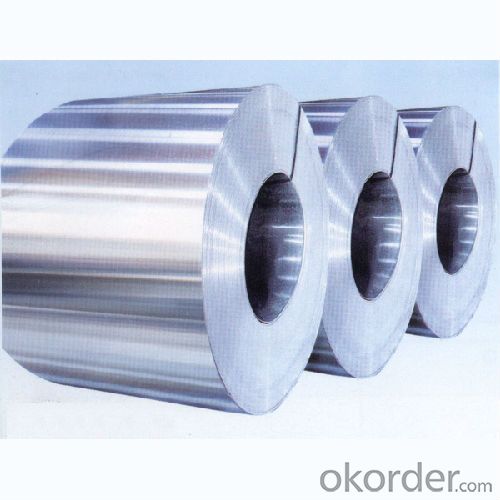
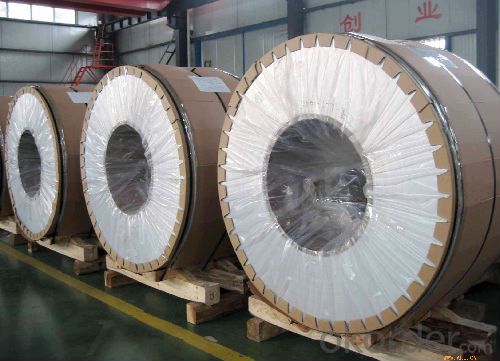
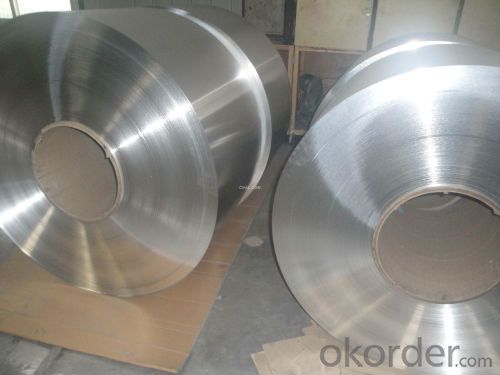
4.Mill Finished Aluminum Coils 3xxx Specification
Alloy | AA3xxx (AA3003, AA3105 etc.) |
Temper | H14, H16, O/F,etc |
Thickness | 0.2mm -- 95mm |
Width | 30mm -- 1500mm |
Standard | GB/T 3880-2006,EN |
5. FAQ of Mill Finished Aluminum Coils 3xxx
A.What is the MOQ?
Uauslly5 tons, but for some sizes, 2 tons is also acceptable.
B. What is the package?
Wooden pallet in containers.
- Q: What are the potential applications of coil-anodized aluminum coils?
- Coil-anodized aluminum coils possess unique properties and advantages, allowing them to be employed in a wide range of potential applications. Here are some of the primary areas where they can be utilized: 1. Architectural: The distinct properties of coil-anodized aluminum make it well-suited for architectural purposes, including cladding, roofing, and facades. With its anodized coating, it offers increased durability, resistance to weather conditions, and color stability, making it suitable for outdoor use in various climates. Furthermore, the coils can be shaped and formed to create different architectural elements, providing design flexibility. 2. Transportation: Due to its lightweight nature, coil-anodized aluminum is ideal for transportation applications. It can be employed in the manufacturing of parts and components for the automotive, aerospace, and marine industries. The anodized coating enhances its corrosion resistance, making it suitable for exterior components and structures. 3. Electronics: Coil-anodized aluminum coils find utility in the field of electronics manufacturing. The anodized coating provides excellent electrical insulation, which is crucial in applications necessitating high conductivity and insulation. It can be utilized in the production of components such as heat sinks, casings, and connectors. 4. Signage and displays: The vibrant and long-lasting colors achieved through coil-anodizing make it a perfect material for signage and displays. The anodized coating ensures color stability against UV radiation and harsh weather conditions, rendering it suitable for both indoor and outdoor applications. It enables the creation of eye-catching and durable signage and displays. 5. Furniture and interior design: Coil-anodized aluminum coils can be employed in the manufacture of furniture and interior design elements. The anodized coating provides a smooth, durable, and scratch-resistant surface, making it suitable for applications like tables, chairs, wall panels, and decorative elements. The wide range of available colors and finishes allows for versatile design possibilities. 6. Industrial applications: Coil-anodized aluminum coils can be utilized in diverse industrial sectors. The anodized coating offers enhanced corrosion resistance, which is advantageous in industries such as chemical processing, food processing, and pharmaceuticals. It can be used in the production of tanks, containers, and equipment that require resistance against harsh chemicals and environments. 7. Energy and sustainable applications: The lightweight nature and durability of coil-anodized aluminum make it suitable for energy and sustainable applications. It can be employed in the manufacturing of solar panels, heat exchangers, and other energy-related components. The anodized coating provides protection against weathering and corrosion, ensuring long-term performance. In conclusion, coil-anodized aluminum coils have extensive and diverse potential applications, spanning across architectural, transportation, electronics, signage, furniture, industrial, and energy sectors. The combination of its lightweight nature, durability, color stability, and corrosion resistance makes it a versatile material for various industries and applications.
- Q: What are the potential applications of coil-perforated aluminum coils?
- Coil-perforated aluminum coils have a wide range of potential applications due to their unique properties. They can be used in architectural and construction projects for decorative facades, sunscreens, and acoustic panels. Additionally, they find use in automotive manufacturing for radiator grilles and soundproofing components. The coils are also suitable for air filtration systems, HVAC equipment, and industrial machinery, thanks to their excellent airflow and heat dissipation capabilities. Overall, the potential applications of coil-perforated aluminum coils are extensive, offering versatility and functionality in various industries.
- Q: How are aluminum coils protected against galvanic corrosion?
- Aluminum coils are protected against galvanic corrosion through a combination of surface treatments and protective coatings. One common method is the application of a thin layer of anodization on the aluminum surface. Anodization involves electrolytically treating the aluminum with an acid solution, which creates a protective oxide layer on the surface. This oxide layer acts as a barrier, preventing the direct contact between the aluminum and other metals that may cause galvanic corrosion. Another method is the use of a protective coating, such as a polymer or paint, on the aluminum coils. These coatings provide a physical barrier between the aluminum and the environment, preventing the exposure of the metal to corrosive elements. The coatings are carefully selected to have good adhesion to the aluminum surface and excellent resistance to corrosion. In addition to surface treatments and coatings, proper design and material selection also play a crucial role in protecting aluminum coils against galvanic corrosion. By ensuring that dissimilar metals are not in direct contact and using compatible materials, the risk of galvanic corrosion can be minimized. This can be achieved through the use of isolation materials, such as gaskets or insulating tapes, to separate the aluminum coil from other metals in contact. Regular maintenance and cleaning also contribute to the protection against galvanic corrosion. It is important to remove any accumulated dirt, debris, or corrosive substances from the aluminum coils to prevent the formation of localized corrosion cells. Overall, a combination of surface treatments, protective coatings, proper design, and regular maintenance are essential in protecting aluminum coils against galvanic corrosion. These measures help to extend the lifespan and maintain the performance of the coils in various applications.
- Q: Can aluminum coils be used in the production of beverage cans?
- Certainly, beverage cans can indeed be produced using aluminum coils. Aluminum is the preferred material for manufacturing beverage cans due to its lightweight nature, durability, and ability to maintain the taste and quality of the contents. Typically, aluminum coils are employed in the canning process as they can be readily molded into the desired can shape. These coils are rolled into sheets, which are subsequently cut and transformed into cans. Additionally, aluminum coils possess exceptional heat conductivity, enabling efficient cooling and faster production rates. All in all, aluminum coils play a crucial role in the production of beverage cans and are extensively utilized within the industry.
- Q: Are aluminum coils suitable for electrical conductors?
- Aluminum coils, indeed, prove to be suitable for electrical conductors. Due to its remarkable electrical conductivity, aluminum has become a widely utilized material in the electrical industry. It possesses approximately 61% conductivity in comparison to copper, the utmost commonly employed metal for electrical conductors. Lightweight, cost-effective, and possessing good thermal conductivity, aluminum coils have become a favored selection for a range of electrical applications. Nonetheless, it is noteworthy that aluminum has a lower tensile strength than copper, thus potentially demanding a larger cross-sectional area to attain an equivalent level of current carrying capacity. Furthermore, to prevent oxidation and guarantee efficient electrical conductivity in aluminum coils, it is imperative to employ proper insulation and connectors.
- Q: Using principles of chemical bonding, explain why solid aluminum is a good conductor of electricity but solid aluminum chloride is not. NaCl has a boiling point of 1413 degrees celcius wheras BrCl has a boiling point of 5 degrees celcius. Account for this difference using chemical bonding and molecular structure.
- Pure aluminium is a good conductor because it's atoms are metalically bonded. This means it's electrons are delocalised and can therefore produce a current. NaCl has a high boiling point because in order to evaporate it first needs to melt. And to melt it you need to break it's lattice structure. Na and Cl atoms are held by strong ionic bonds. BrCl on the other hand is covalently bonded. It's molecular structure does not need to be broken in order for it to melt or boil. All that has to be done is weak van der waal bonds need to be broken.
- Q: I bought some cheap aluminum foil, but one weighs much less than the other brand for the same thickness and length, why?What is the other made of? Is it still good to use for grounding something?Thank you.
- Aluminum foil is aluminum foil, it has nothing but aluminum in it. One of them is misstating the thickness, or you are mistaken about the weight or width.
- Q: How are aluminum coils used in the construction industry?
- Aluminum coils are widely used in the construction industry for various purposes such as roofing, siding, and insulation. These coils are typically formed into sheets or panels which are then used to create durable and lightweight structures. Additionally, aluminum coils are often employed in the manufacturing of gutters, fascia, and soffit systems, enhancing the overall aesthetics and functionality of buildings. Due to their corrosion resistance and high strength-to-weight ratio, aluminum coils are favored for their longevity and ease of installation, making them a popular choice in the construction industry.
- Q: What are the different hardness levels of aluminum coils?
- There are various hardness levels of aluminum coils, which are classified based on the alloy and tempering process used during their manufacturing. The most common hardness levels for aluminum coils are: 1. Soft (O temper): This is the most malleable and ductile state of aluminum coils. They are highly formable and suitable for applications that require extensive shaping or bending. 2. Quarter Hard (H12 temper): Aluminum coils in this hardness level have undergone a slight cold-working process, which increases their strength and stiffness. They are less malleable than soft coils but still retain good formability. 3. Half Hard (H14 temper): Coils in this hardness level have undergone a moderate cold-working process, resulting in further increased strength and stiffness. They are less formable than quarter-hard coils but are ideal for applications that require higher strength. 4. Three Quarter Hard (H16 temper): Aluminum coils in this hardness level have undergone a more intensive cold-working process, making them even stronger and less formable than half-hard coils. They are suitable for applications that require high strength and minimal deformation. 5. Full Hard (H18 temper): Coils in this hardness level have undergone the most extensive cold-working process, resulting in maximum strength and minimal formability. They are commonly used in applications that require high structural integrity and resistance to deformation. It is important to note that the specific hardness levels available for aluminum coils may vary depending on the alloy and manufacturer. Additionally, different industries and applications may have specific requirements for hardness levels, so it is crucial to choose the appropriate hardness level based on the intended use of the aluminum coils.
- Q: What are the different surface finishes for pre-painted aluminum coils?
- There are several different surface finishes available for pre-painted aluminum coils. These finishes are applied to the aluminum surface to enhance its appearance, durability, and resistance to external factors. Some of the common surface finishes for pre-painted aluminum coils include: 1. Polyester (PE) Finish: This is the most widely used surface finish for pre-painted aluminum coils. It offers good durability, weather resistance, and color retention. Polyester finishes are available in a wide range of colors and gloss levels. 2. Polyvinylidene Fluoride (PVDF) Finish: PVDF coatings provide excellent resistance to weathering, UV radiation, and chemical exposure. These finishes are highly durable and maintain their color and gloss for extended periods. PVDF finishes are often used in architectural applications where color retention and longevity are important. 3. Polyurethane (PU) Finish: Polyurethane coatings offer good resistance to abrasion, chemicals, and weathering. They provide a smooth and glossy appearance and are available in a wide range of colors. PU finishes are commonly used in applications that require high durability and resistance to outdoor conditions. 4. Epoxy (EP) Finish: Epoxy coatings provide excellent chemical resistance and adhesion. They are often used in industrial applications where corrosion resistance is crucial. Epoxy finishes can be combined with other coatings, such as polyester or PVDF, to enhance their performance. 5. Acrylic (AC) Finish: Acrylic coatings offer good weather resistance and color retention. They are often used in architectural applications where aesthetics and durability are important. Acrylic finishes provide a glossy appearance and are available in a wide range of colors. These are just a few examples of the different surface finishes available for pre-painted aluminum coils. The choice of finish depends on the specific requirements of the application, including the desired appearance, durability, and resistance to external factors.
Send your message to us
PVC Aluminum Coil 3xxx Mill Finished
- Loading Port:
- China Main Port
- Payment Terms:
- TT or LC
- Min Order Qty:
- 5 m.t.
- Supply Capability:
- 100000 m.t./month
OKorder Service Pledge
OKorder Financial Service
Similar products
Hot products
Hot Searches
Related keywords
